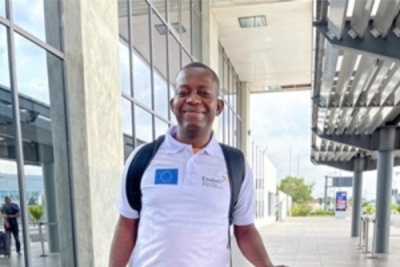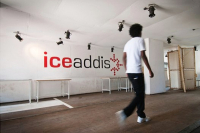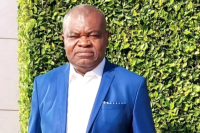Unlike most of the fintech solutions sprouting across Africa, the solution chose to add Sharia-compliant products and services.
HalalVest is a fintech solution developed by a Nigerian start-up. It facilitates access to financial services such as savings, loans, investments, insurance, pensions, and payments.
As a Halal-friendly solution, the fintech works with financial institutions to help them list their Sharia-compliant products. It facilitates electronic payments and the collection of Islamic alms like zakat, sadaqah, and waqf. It aims to democratize access to interest-free financial products and services.
“We are focused on building and sustaining long-term access to ethical financial products and services. [We aim] to be a leading Non-Interest Fintech Bank in Africa and Middle East region,” the solution indicates on its web platform.
Users can sign up for HalalVest's services through their Android app by completing a specialized form. After verification, they gain access to a variety of ethical savings and investment plans from multiple providers. HalalVest serves as a convenient platform for accessing traditional financial services and more. Through their web platform and mobile app, users can conveniently transfer funds to any bank globally.
The fintech claims a thousand members and serves around 5 countries in Africa and the Middle East. According to Play Store, its mobile application has already been downloaded over 100 times.
Adoni Conrad Quenum
The decision is an important step to ensure education while waiting for things to get back to normal after the pro-Sonko protests.
Senegal’s public universities will adopt distance learning for some time, Minister of Higher Education Prof Moussa Baldé announced on RFM radio’s Grand Jury show last June 11.
According to the government official, the universities of Dakar and Ziguinchor were ransacked a few days earlier, so the rectors of the universities would meet to reflect on how to make a shift to distance education with “hopes that after Tabaski [June 28-29, ed note] face-to-face learning will resume.”
The University of Thiès will follow the same agenda, he added. The decision to shift back to distance teaching is taken just days after a series of violent demonstrations following the conviction of opposition leader Ousmane Sonko. During those demonstrations, infrastructure and universities were ransacked, including six faculties of the Cheikh Anta Diop University (UCAD).
Three years ago, when the coronavirus pandemic was raging, Senegalese universities tested distance learning using platforms developed by the government. They allowed learners to take courses from home, familiarizing themselves with new learning methods.
Students can take courses remotely thanks to investments being made by the government since 2013. In 2019, the Smart Education project was launched in the framework of the 2019-2035 Plan for an Emerging Senegal. The project aims to deploy tech platforms to improve teaching and learning at universities, secondary and primary schools. Over time, the government has enhanced investments in that cause.
Samira Njoya
Agriculture is one of Côte d'Ivoire's major economic sectors, and the world's biggest cocoa and cashew producer has been multiplying efforts to foster partnerships and develop this sector.
The Ivorian capital, Yamoussokro, will house a prestigious digital farming school in the coming months. The project was officially kicked off last Friday, June 9, by OCP Africa and Mohammed VI Polytechnic University (UM6P).
The new school will, according to the Minister of Higher Education, Adama Diawara, "produce high-quality human resources who will support the country's development, by tackling agricultural issues with innovative solutions, creating jobs for our graduates, and boosting entrepreneurship.
OCP Africa & @UM6P_officiel posent la 1ère pierre de la #Digital #Farming School à Yamoussoukro, en collaboration avec @inphbpolytech. Avec son approche pédagogique axée sur du Peer Learning et du Learning by farming, cette école, 1ère du genre en Afrique, sera adossée à une… pic.twitter.com/TmOfDxL014
— OCP AFRICA (@OCP_Africa) June 9, 2023
The upcoming school is valued at $4.9 million and is expected to open in the next 10-12 months. It wil be the first of its kind in Côte d’Ivoire.
The first batch of trainees should regroup 100 young AgriTech enthusiasts, according to a press release issued by OCP Africa. They will learn how to use digital tools and new farming technologies.
Also, the school will be attached to an experimental farm where the trainees will be able to put in practice and share what they learn.
The project is one of Morocco's many significant projects in Côte d'Ivoire - Projects initiated by King Mohammed VI, to bolster cooperation between the two nations.
For Côte d'Ivoire, however, the new digital farming school results from the government's efforts to develop agriculture. A sector, which, according to the African Development Bank (AfDB) is set to grow by 6.7% in 2022-2023.
Samira Njoya
The startup behind the solution was founded by two Moroccans with decades of experience in the pharmaceutical industry. When they decided to venture into entrepreneurship, they turned to a rapidly-growing sector they knew best: pharmaceuticals.
Blink Pharmacie is a digital solution developed by Moroccan start-up Blink Pharma. It provides pharmacies with access to a marketplace where they can directly source pharmaceutical products from wholesalers and laboratories. The start-up, based in Casablanca, was founded in 2019 by Bertul Adil and Sami Khalil Mohamed Ali.
One of the main objectives of this solution is to prevent stock-outs and delivery delays. "We want to accelerate the digitalization of healthcare services [...] The healthcare sector is undergoing a profound transformation due to digital technology, and we aim to support healthcare stakeholders in this transformation. Leveraging our in-depth knowledge of the scientific and regulatory environment, as well as our background in healthcare, we have a deep respect for the ethical rules that govern the sector," says Sami Khalil Mohamed Ali.
Blink Pharmacie launched its mobile app for Android and iOS in 2020. Users can create an account on the app to access the marketplace. During the account setup process, users are required to specify their professional designation, such as pharmacist, pharmacy technician, laboratory representative, wholesaler, or visitor. These designations are then authenticated by the start-up to provide a better framework for its activities.
Laboratory representatives and wholesalers can use the app to share news about new product launches or advertising campaigns and monitor prospects in real-time. Based on the data they collect, they can adjust their marketing strategies for greater efficiency.
According to Blink Pharma, the platform currently has over 4,500 registered pharmacists, more than 41 wholesalers, and over 20 laboratories. The Android app alone has been downloaded more than 5,000 times, as reported by Play Store data.
"We faced significant challenges in authenticating pharmacists, particularly due to the regulations governing the medication supply chain. Initially, it was difficult to convince people about our idea. However, through hard work, we have successfully carved out a niche for ourselves in the market," explains Sami Khalil Mohamed Ali.
Adoni Conrad Quenum
He is an economics expert with some 14 years of experience in the cereals industry. A few years ago, he co-founded an agritech company focused on the cereal segment.
Steve Hoda (photo) is a Beninese economist trained at the Faculty of Economics and Management Sciences of the University of Abomey-Calavi, where he graduated with a Master’s in Economics in 2009.
In 2017, he co-founded AfriRice, the agritech company that is now known as AfriCereal Group. His agritech company develops and implements innovative agriculture solutions, with a particular focus on cereal crops. It provides mechanization solutions for agricultural operations, offers technical assistance to farmers, and facilitates the connection of various stakeholders in the cereal industry.
The company aims to simplify agricultural tasks, minimize post-harvest losses, boost agricultural productivity, and improve farmers' incomes. With its solutions tailored to the African continent, AfriCereal Group is committed to providing safe and nutritious food worldwide. It works with non-governmental organizations and government institutions, assisting farmers in their agricultural campaigns from plowing to commercialization. It operates in the West African sub-region, particularly in Côte d'Ivoire, Burkina Faso, Togo, and Benin.
Its CEO, Steve Hoda, is the head of the agriculture commission of She is Great Benin, a program that encourages girls in STEM. He is also the coordinator of the Beninese chapter of the International Alliance for Sustainable Development Goals (AIODD). The agritech entrepreneur is an economic expert for local media outlet Le Soleil Bénin and also in charge of the management of a mini rice mill installed in Kérou, Northwestern region of Benin.
Between 2010 and 2011, he worked as an assistant to the Deputy Secretary-General for budget/program monitoring and evaluation at the Beninese Ministry of Development, Economic Analysis, and Prospective.
In 2018, AfriRice was celebrated by the FAO as one of the 20 success stories of agricultural innovations able to reduce hunger. The team was also selected by the US African Development Foundation to receive about $100,000 in grants to mechanize agricultural operations in three major rice and soybean production areas in Benin.
Melchior Koba
Despite the steady rise in the volume of funds raised by African start-ups over the past few years, gender inequalities are still very much in evidence. In the 16 months ending on April 30, 2023, start-ups led by women have raised just $119 million, representing 2.9% of the overall funding raised by African startups during the period.
African women-led startups raised a cumulative $119.05 million between January 1, 2022, and April 30, 2023, according to a report published, on June 7, 2023, by tech news portal Disrupt Africa and pre-seed investment program Madica.
Entitled "Diversity Dividend: Exploring Gender Equality in the African Tech Ecosystem", the report explains that women-led startups raised just 2.9% of the $4.05 billion raised by African startups during the period under review.
Of the 711 start-ups that raised funds, 83 were headed by women (11.7%), while 149 had at least one woman in their founding team (21%). The latter category raised $369.10 million. Nigeria tops the list of countries of origin of start-ups with at least one woman in their founding team, ahead of Kenya, South Africa, Egypt, Morocco, Ghana, and Tunisia.
The report also highlights the fact that Africa's tech landscape is largely dominated by men. Out of a total of 2,395 startups tracked by Disrupt Africa, only 350 (14.6%) were founded or co-founded by women, while only 230 (9.6%) were headed by women.
Although figures vary from one country to the other, the African start-up landscape is still a long way from being gender inclusive. No country has more than 23% of women founders. The countries with the most women founders or co-founders are, in order, Rwanda, Tunisia, Senegal, Ethiopia, and Uganda. The four most developed ecosystems on the continent (Nigeria, South Africa, Kenya, and Egypt) are not gender diversified.
The legal-tech sector tops the list of those with the most women founders and co-founders (26.9%). This is followed by healthtech (22.1%), recruitment and human resources management (22%), ed-tech (17.8%), and e-commerce (17.3%).
The report also shows that 80.8% of women think they have experienced professional prejudice because of their gender. Meanwhile, 50% of them believe they lost professional opportunities directly because of their gender, and 69.2% of the female founders also indicated that they felt negatively impacted by the fact of being women when speaking to a potential investor.
A growing number of African startups are specializing in blockchain, but they face challenges like a lack of funding, limited access to training, and widespread misconceptions associating the technology with fraud.
The majority of African blockchain startup founders believe there is no government support for blockchain in their countries, according to the “Africa Blockchain Report 2023” published in April 2023 by the think tank Africa Blockchain Institute and the non-profit Algorand Foundation.
The report is based on a survey and in-depth interviews with stakeholders in four African countries. 80.5% of the respondents reported a lack of government support for the development of this technology, whose application areas and use cases are extremely varied. Referring to the support they need, these players cited funding (58.5%), training (43.9%), entrepreneurial mentoring (29.3%), acceleration programs (26.8%), market access support (22%), and incubation programs (17.1%), among others.
The report confirms that the main challenge facing start-ups in Africa remains the lack of financing (56.1%). Insufficient access to training programs and widespread misconceptions about blockchain technology tied for second place (39%), ahead of an inadequate regulatory framework (31.7%) and a lack of incubators (17.1%).
According to the entrepreneurs surveyed, widespread misconceptions about blockchain in Africa stem from the fact that the majority of the population thinks the technology is only about crypto-currencies, and often associates it with crypto-related scams and financial fraud. Despite the lack of government support, African start-ups active in this segment are managing to develop innovative solutions.
The blockchain applications most developed by those covered by the survey are smart contracts (24.4%), identity management systems (22%), cross-border payment solutions (17.1%), cryptocurrency exchange platforms (14.6%), the creation of non-fungible tokens/NFTs (14.6%), supply chain and logistics management systems (12.2%). Other applications include advertising and marketing, anti-money laundering, and electronic voting.
Also, 58.5% of developers surveyed have been working on their applications for less than a year, while 24.4% have been working on them for more than five years. This shows that the adoption of blockchain innovations is still in its infancy in Africa, particularly when it comes to the development of use cases with a direct impact on individuals, businesses, and society as a whole. The report notes in this context that use cases for blockchain technology are much more varied in English-speaking Africa than in French-speaking Africa, where the majority of start-ups focus on the finance segment.
The Africa Blockchain Institute also points out that the majority of blockchain start-ups on the continent are still in the early stages of development. 43.9% of them are in the ideation stage and 29.3% are in the seed phase. 9.8% of these entities are already well-established and profitable, while only 2.3% are in the scaling phase.
iceaddis is a major player that is advancing tech innovation in Ethiopia. As a dynamic innovation hub, it offers a collaborative workspace, incubation programs, and a wealth of resources to support the country's entrepreneurs and innovators.
iceaddis is an Addis Ababa-based innovation and entrepreneurship center that is key in strengthening Ethiopia's tech ecosystem. It was founded in 2011 by three former GIZ (German Development Agency) staff in Ethiopia, namely Markos Lemma, Florian Manderscheid, and Oliver Petzoldt,
The heart of its ecosystem lies in its co-working space, an open environment where entrepreneurs, developers, and creatives can come together, share ideas, and collaborate on joint projects. The space fosters the creation of strong networks and stimulates entrepreneurship by offering practical support and mentoring opportunities.
In addition to the coworking space, iceaddis offers incubation programs to help start-ups turn their ideas into successful businesses. These programs offer personalized coaching, access to experienced mentors, and funding opportunities to help entrepreneurs get their businesses off the ground.
Its flagship program is ice180, a 180-day support program designed to enable high-potential entrepreneurs to start their businesses. The program aims to make startups investment-ready “with entrepreneurial knowledge skills, and a strong networking.”
iceaddis is also committed to defending the interests of technology start-ups. As one of the founding members of the i4policy community, it advocates innovative companies and start-up communities to policy-makers and regulators. The innovation center regularly organizes conferences, competitions, and hackathons, enabling participants to share knowledge, develop skills, win awards, and foster collaboration.
To date, it has supported over 190 entrepreneurs, accelerated 35 startups, and incubated 54 companies. It has also organized over 350 events, bootcamps, and hackathons in Ethiopia. The center works with local and international organizations as advisors on youth programs and joint project management in various sectors.
Melchior Koba
South Africa remains the best African start-up ecosystem, ahead of Mauritius, Kenya, Nigeria, and Egypt. Lagos is the only African city in the Top 100 of "start-up friendly" cities worldwide.
Fifteen African countries feature in the top 100 ecosystems conducive to the emergence and development of ecosystems worldwide, according to a report published by startup ecosystem map last May 30. To establish this ranking, the research firm focused on more than 30 indicators divided into three main categories.
The first category is quantity, which uses indicators like the number of start-ups, coworking spaces, accelerators, start-up-related meetings, etc. The second is quality, using indicators like total investment in start-ups, number, and size of unicorns, presence of R&D centers set up by major international technology companies, the presence of subsidiaries of multinationals, etc. The last category is the business environment, which is measured using indicators like Internet speed, R&D spending, tax rates applied to start-ups, availability of various technological services such as electronic payment and cryptocurrencies, level of corruption, etc.
The report, entitled "Global Startup Ecosystem Index 2023", reveals that South Africa (53rd in the world) has the best startup ecosystem in Africa, despite falling four places in the global ranking compared with 2022. The Republic of Mauritius (61st worldwide) occupies second place in Africa, ahead of Kenya (62nd worldwide), Nigeria (64th worldwide), and Egypt (67th worldwide).
They are followed by Ghana, Cape Verde, Senegal, Namibia, and Tunisia, closing the African top 10. The report also points out that five African countries have improved their overall ranking. Mauritius and Senegal made the strongest progress compared with the 2022 edition, gaining 10 places each. The two countries entered the Top 100 best start-up ecosystems in 2021 and 2022 respectively.
The biggest declines were recorded by Morocco, which dropped 14 places compared with 2022 to 93rd position worldwide this year, and Rwanda (-11 places). Uganda is the only African country to re-enter the index in 2023 after it dropped out of it in 2022.
The report also ranked 1,000 startup cities worldwide. Lagos (82nd worldwide) is the only African city in the Top 100. The Nigerian economic hub owes its ranking to its highly dynamic ecosystem, with over 400 start-ups, including unicorns Jumia and Flutterwave, and 35 active incubators.
The best-represented countries in the ranking of the 1,000 cities with the best start-up ecosystems in the world are Nigeria (5 cities), South Africa (4 cities), and Kenya (2 cities). Victoria (Seychelles) made the greatest progress, moving up 592 places to the 232nd position. It was followed by Port-Louis (+269), Dakar (+155), Tunis (+57), Cairo (+36), and Accra (+28).
The first edition of the digital summit GITEX Africa was held from May 31 to June 2 in Marrakech, Morocco. During the technology trade show, which brought together tech companies and start-ups, government delegations, global investors, international speakers, and tens of thousands of technology executives from more than 100 countries, We Are Tech Africa spoke with Freddy Mpinda, advisor to the Congolese minister in charge of the Digital Sector.
WAT: President Félix Tshisekedi expressed his ambition to leverage digital technologies to improve integration, good governance, economic growth, and social progress. What are the main projects underway to achieve this?
Freddy Mpinda: Indeed, the DRC has undergone a decisive digital turning point since the arrival of President Tshisekedi, who is advancing his vision to leverage digital technologies for integration, economic growth, and good governance. This vision is set out in the National Digital Plan (PNN) Horizon 2025 and implemented in a government program called the Digital Transformation Program (PTNRDC), implemented by the Ministry of Digital Affairs. The PTNRDC focuses on 8 priority projects (the digital code, e-Gouv (e-Citoyen, e-Cadastre), National Data Center, Government Intranet, Electronic Payment Aggregator, Tele-medical expertise, e-Education).
Currently, we have several projects underway. We have infrastructure projects because we're a big country and we want to connect as many Congolese as possible. We've expressed the need for 50,000 km of fiber optics because recent studies have shown that over 40 million of the country's 100 million people are not connected to anything. After all, mobile operators are set up in economically profitable regions, and rural areas are sometimes left out. So, we need fiber optics to connect as many Congolese as possible. Apart from this, we have e-governance projects, projects to teach digital skills to the youth and to support entrepreneurs, build data centers, deploy the national bar-coding platform that generates codes with the national prefix (605), and so on… So, projects are ongoing and we are trying to implement them with several partners.
WAT: As you mentioned earlier, DRC has a 2025 digital plan. Can you tell us the goals of that plan and what the government hopes to achieve by that timeline?
FM: Well, the plan has a deadline, which is 2025, because we’ve learned from other African countries and we wanted a time-bound plan. If you go through it, you will notice that it mentions that in 2025, it will be reviewed, amended, and relaunched. We're well aware that the projects we're working on, particularly infrastructure, can’t necessarily be completed by 2025. Nevertheless, we decided to launch as many projects as possible and take stock in 2025. So 2025 will be an evaluation phase. We'll see what has worked, and then we'll roll out a new plan. The Ministry of Digital Affairs has already achieved a great deal in a very short period, notably the adoption of the Digital Code, digital norms and standards in the DRC, the Startup Act (a law dedicated to start-ups, with a wealth of incentives and opportunities, editor's note), and the recruitment of career civil servants to the General Secretariat for Digital Affairs.
WAT: Over the past two years, your country has signed several partnerships with Estonia and China. What has the DRC gained from these partners, and what has it given in return?
FM: Well, that's easy to say. What did the DRC give in return? The DRC has given everything in return and provided the main inputs for the digital revolution. We hold almost 60% of the world's raw cobalt, Coltan, which is used in cell phones, and Niobium... We have all these metals. The real question is what the DRC is going to get in return because we've been contributing our minerals to this fourth revolution for many years now. And that's why our policy is to be open. We discuss as much with the Chinese, the Estonians, the Emiratis, and also with our African partners like the South Africans, the Zambians, and so on. What we need is to transform locally some of our raw materials, which today are just potential wealth-generating sources but are not yet generating real wealth. We have joint projects with African countries and countries around the world, but projects that must be profitable for the DRC, because, over the past 60 years, we've been giving away our raw materials and receiving very little. As far as digital transformation is concerned, feedback is vital for us and our partners. There's no need to reinvent the digital sector.
WAT: What does the DRC stand to gain from digital development?
FM: Digital technologies should be seen as a tool. The proof is that [the Ministry of Digital Affairs] is a transversal ministry, in other words, one that serves everyone. Today, at the GITEX Africa panel, I pointed out that the priority is to solve Africa's main problems. Digital technology is a powerful tool for solving our problems. Our top priority, as the Covid-19 crisis has shown, is to produce our food as close as possible to consumers. So for us, agriculture is a priority. The second priority is education. In March and April 2020, we found ourselves with 18 million Congolese schoolchildren forced to stay at home, with no possibility of learning remotely. So for us, digital technology must enable distance learning. The same goes for healthcare. We found ourselves with a pandemic overnight, and we had to find respirators, masks, and so on. Digital technology must help us improve our health strategy, particularly our vaccination strategy. We need to know who's been vaccinated and who hasn't. We're a fortunate country. Fortunately, we are a country that has already experienced a pandemic before, Ebola. Digital technology must be at the service of health and epidemiological surveillance. Agriculture, education, and health are our priorities.
WAT: In short, you mean that digital technologies are tools to enable DRC to achieve its sustainable development goals and more. But do you have the digital skills needed to keep up?
FM: when you read the plan, you will notice that it is based on four pillars namely infrastructure, content, applications, and governance and regulation. We do have a fifth pillar, which is education, but we decided that it couldn’t be a pillar by itself because for instance, to develop infrastructure, we need education. We need engineers, we need technicians, and so on. In terms of content, those who will develop applications, i.e. coders and so on, need education. In terms of application use, those who will be working to enable the State to become increasingly digital need education. Civil servants need to be brought up to speed. Governance regulation needs education. So education is everywhere. In reality, our plan is based on four apparent pillars and one invisible pillar, which is education. The Minister for the Digital Economy has made the development of digital skills a major focus of his action. The development of Congolese digital skills is a recurring theme in the latest memorandum of understanding signed in China by the two digital ministers.
Interview by Adoni Conrad Quenum
More...
He is an outstanding software developer with over 14 years of experience in building software and web applications. In his home country, Tanzania, he set up an online bus ticket booking application.
Abraham Itule (photo) is a Tanzanian entrepreneur and computer scientist with a degree in Information Technology from Manchester University in 2012. In 2022, he founded Safiri App, a mobile app that allows users to buy bus tickets in Tanzania.
Safiri App connects transport operators and travelers, enabling customers to buy their travel tickets from the comfort of their home, office... It also provides travelers with real-time updates on the location of the means of transport and other transit information.
Safiri App users can also entrust parcels or goods to be conveyed by transport companies registered on the platform. For bus operators, the company offers a simple ticketing system that integrates mobile money and SMS.
Recently, the mobile app has been selected among the 12 African start-ups to attend the Africa Tech Summit in London on June 23. On this occasion, Abraham Itule will be speaking about public transport and logistics in Africa.
Safiri app was launched through Itule Limited, Abraham Itule’s software company. Besides his duties as the CEO of that software company, the tech entrepreneur is also the CTO of UK-based Hexis, which uses artificial intelligence to create a personalized nutrition plan to optimize the performance of athletes and coaches.
His professional career began in 2009 with Zippro System Ltd, where he worked as a programmer in the UK. Since then, he has worked as a developer, both back-end and front-end, at several institutions, including The Virtu Group, Spindrift, IBM, Cambridge University Press, Santander UK, and Instant Access Technologies. In 2021, he was a senior full-stack engineer at UK financial technology company Akrod.
Melchior Koba
Cassava is one of the most widely consumed foods in sub-Saharan Africa. It is easy to cultivate and can be processed into many things. It nevertheless faces threats that can be overcome with technology.
On Tuesday, June 6, smart farm management software provider FarmERP announced the deployment of its FarmGyan platform based on AI, machine learning (ML), and computer vision in Nigeria.
According to the provider’s release, the platform aims to boost cassava cultivation in the country to improve productivity, profitability, and predictability.
"FarmERP [...] brings a specialized focus on helping Cassava farmers by extending the crop life [...] in Cassava plantations up by 40% through its tech-enabled platform," the release said.
Nigeria's cassava industry is the largest in Africa. For several years, the country has been the world's leading producer of cassava, accounting for 21% of global output. However, cassava plantations face several challenges, including the proliferation of pests, the presence of diseases, and extreme weather conditions.
To solve these problems, the FarmGyan platform will digitize the growth path. It will also monitor plants and quickly identify weed infestation by using drone images and AI models.
The platform will also be able to detect crop and soil moisture, crop water requirements and irrigation, and manage diseases through satellite-based crop health monitoring tools. Overall, FarmGyan will contribute to effective and efficient crop management.
After Nigeria, the company will extend its services to other African countries, notably Angola and Ghana. The aim is to help as many stakeholders as possible to practice Agriculture 4.0 to achieve profitable and sustainable agribusiness.
Samira Njoya
For 10 years, he worked for two of Nigeria’s largest banks, handling operations and customer relations. He then moved into technology and founded one fintech company and an internet marketing agency.
Chibuike Goodnews (photo) is a Nigerian fintech entrepreneur who graduated from Ahmadu Bello University in 2015 with a master's in finance, and from the Lagos Business School, where he trained in entrepreneurship development. He is the co-founder and director of Astravest, a fintech company founded in 2021.
The company, co-founded with Joshua Chinemezu (a software engineer), offers savings and investment solutions that aim to empower users and help them achieve financial freedom. It gives Africans access to multiple investment options, the information they need to make decisions, and a simple platform to grow their money or move their funds between different sectors.
With just 5,000 naira, or around $10.5, users can invest in commodities, real estate, or fixed-income assets. Astravest enables companies to offer real estate investments as a service. It is sufficiently secure, and users have to go through a vetting process before making investments.
Apart from Astravest, Chibuike Goodnews also founded Dochase Adx, an internet marketing agency launched in 2016. Through that agency, he provides a full range of marketing solutions to help both large and small businesses attract sales and reach target markets online.
Before becoming an entrepreneur, he worked for United Bank for Africa (UBA) as a banking executive between 2005 and 2006 and as a customer relationship manager from 2013 to 2016. Between 2006 and 2013, he was in charge of banking operations at Zenith Bank in Nigeria.
Melchior Koba
Digitization is a major development challenge for WAEMU countries. Despite the ambitious national strategies and progress made, digital transformation in the region is still lagging compared to the global performance.
On Wednesday, June 7, the West African Development Bank (WADB-BOAD) and the Smart Africa Alliance signed a framework agreement to accelerate digital transformation in WAEMU countries.
The agreement was signed by WADB President Serge Ekue (photo, right) and Lacina Koné (photo, left), Director General of the Smart Africa Alliance, in Lomé, Togo.
The new agreement aims to support the development of the e-commerce industry in the WAEMU region and support the implementation of financial inclusion projects to advance subregional integration in line with Point 1 of Djoliba, the WADB’s 2021-2025 strategic plan, reveals Togolese media outlet Agence togolaise de presse.
"The vision is to transform our Africa, to ensure that all our populations can project themselves into the future in a very concrete way by using digital technology in various fields, notably agriculture, and energy," said Ekue.
Since its creation in 2014, Smart Africa Alliance -comprising 35 out of the 54 African countries- has been working to make digital transformation a tool for economic development by involving the private sector and member countries in concrete initiatives.
With this agreement, the WADB partners with an alliance whose aim is to leverage digital technologies for development in Africa. The two parties will implement several projects to support innovation. They will disseminate startup toolkits in member countries, enhance capacities and upskill actors in the WAEMU region while scaling up the Smart Africa Digital Academy (SADA).
Samira Njoya















